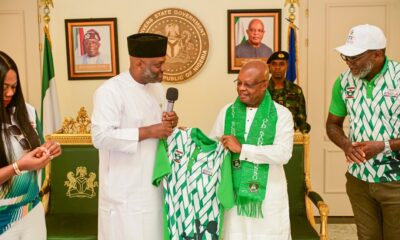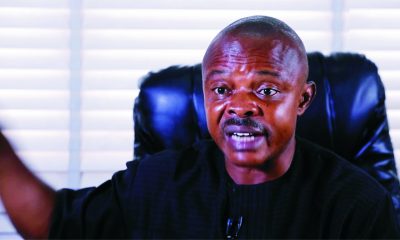Featured
Southern, Middle Belt Leaders Reject NLTP, Waterways Bill …In Nigeria, Cattle Compete For Space With Humans -Ortom …Senate To Break PIGB Jinx In 2020, Lawan Assures
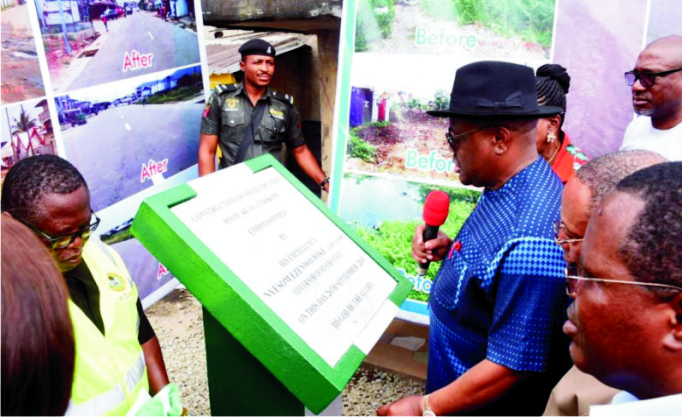
The Southern, Middle Belt Leaders Forum (SMBLF), has expressed concern over the inability of the Federal Government to mobilise national consensus to confront the monumental tragedies bedevilling the country.
SMBLF noted that instead the Federal Government has busied itself with policies that are divisive and smack of domination and conquest of sections of the country by a section.
Arising from its meeting in Abuja against the state of general insecurity consuming human lives on daily basis, the leaders explained that the country’s leadership has failed in mobilising national consensus to confront the monumental tragedies confronting the country.
In a joint statement issued at the end of the meeting by Yinka Odumakin, Prof Chigozie Ogbu, Senator Bassey Henshaw and Dr Isuwa Dogo, for the South-West, South-East, South-South and Middle Belt, respectively, SMBLF rejected the National Livestock (cattle) Transformation Plan(NLTP), Rural and Urban Grazing Areas (RUGA) settlement, saying, “Meeting restates the rejection of SMBLF to the use of the collective resources of Nigerians to convert herdsmen, majority of whom are non-Nigerians, from nomadic to sedentary lifestyles while doing their private business that has nothing to do with the rest of us beyond being their market. It is akin to government making budgetary allocations for Coca-Cola to produce drinks to sell to Nigerians.”
Apart from the plan not making any economic sense for the country, SMBLF said there are other fundamental problems it raises.
“There is the issue of citizenship, which Bauchi Governor, Bala Mohammed, exposed that Fulanis from all over Africa are going to benefit from the scheme.
“The Fulani man is a global or African person. He moves from Gambia to Senegal and his nationality is Fulani…So, we cannot just close our border and say the Fulani man is just a Nigerian.
“Why are we closing our border with Benin Republic where there are many people of Yoruba origin there? Are Igbos who are aborigines in Haiti to come to Nigeria without consular services? What is the contribution of those Fulani imports to the development of Nigeria to come and live on our resources when our citizens are the poorest on earth? Why is it difficult to apply common sense in our inter-ethnic relations in Nigeria?”, the meeting asked.
SMBLF noted, “The above shows clearly that NLTP will only escalate the clashes between the indigenous communities and cattle settlers as experiences in Southern and Middle Belt areas of Nigeria have shown that the Fulani imports do not assimilate into the ways of lives of Nigerians in those parts of the country where they reside. They live apart from the locals and set up communities with alien culture that disrupts the cultural flow of the indigenes.
“The subterfuge of the whole deal is exposed in that while government officials deceive Nigerians that the plan will stop open grazing for ranching, option 1 in it provides for the establishment of corridors for migrant cattle with feeding and watering points along the routes. This is as stark as the lie that “livestock” includes other sources of meat. The entire plan is about cattle and herdsmen.”
SMBLF said it does not accept the policy and asked the Federal Government to allow those who are in cattle business establish ranches on their own under the guidelines and laws of the host state.
The meeting observed that the Waterways Bill is another conquest agenda in sync with NLTP, adding that it is the vexatious Executive Bill titled “A Bill for An Act to Establish a Regulatory Framework for the Water Resources Sector in Nigeria, Provide for the Equitable and Sustainable Redevelopment, Management, Use and Conservation of Nigeria’s Surface Water and Groundwater Resources and for Related Matter”.
It said the bill seeks to abrogate all existing laws and institutions governing the management and control of water resources nationwide and replace them with new ones in a manner that gives the President, through the Minister of Water Resources, the power to control the nation’s rivers (especially those that pass through more than one state), lakes and underground water.
It added, according to it, “All surface water and groundwater wherever it occurs, is a resource common to all people, the use of which is subject to statutory control. There shall be no private ownership of water but the right to use water in accordance with the provisions of this Act.”
It explained, “The Waterways Bill is another land-grabbing move like RUGA by ethnic supremacists who are working against the unity of the country. Major rivers in Nigeria can be made available, by federal law if the bill is passed, to Fulani pastoralists and there is nothing the indigenous people within such vicinities can do about it.
“The police and the security agencies will be handy to enforce it and it will be another white farmers versus the African landowners’ scenario in Southern Africa during the apartheid season.
“It is a recipe for unending armed conflicts. It also means the Federal Government can, wherever it identifies a large body of underground water (aquifers), decide to open a “Federal” water scheme, and no one can stop Fulani cattle owners from taking over such places.
“The “all people” in the bill also means that pastoralists from any part of Africa, as explained by Bauchi governor, can come and settle along the lush waterways of the Middle Belt and Southern protected by Nigeria’s federal law to the detriment of indigenes who have for centuries depended on their natural resources for their livelihood.”
The meeting called on all lawmakers from the South and Middle Belt to resist the bill as SMBLF shall be keenly interested in developments around it.
Meanwhile, the Benue State Governor, Samuel Ortom, has called on the British Government to lend its support to the entrenchment of ranching in Nigeria as the official method of animal husbandry, saying the nomadic system has become archaic and should be discarded.
He spoke, yesterday, at the Benue Peoples House, Makurdi, during a courtesy call on him by the British High Commissioner to Nigeria, Mrs. Catriona Laing.
The governor stated that while ranching is being practised in developed countries, animals, especially cattle, compete for space on roads, schools and airports in Nigeria, a scenario he described as hostile to development.
He said attacks on Benue communities by militia herdsmen had inflicted deep pains on people and government of the state with thousands displaced and infrastructure destroyed, stressing that 60 percent of those who were staying in eight Internally Displaced Persons (IDPs) camps were children while 30 per cent were women.
Ortom stated that he was happy because the entire country had keyed into ranching which people of the state adopted earlier as a lasting solution to farmers and herders crisis, pointing out that what the state is still grappling with is reconstruction of the destroyed infrastructure and the rehabilitation of the traumatised IDPs.
The governor told the British envoy that his administration places high premium on women empowerment as well as provision of employment opportunities for youths.
In her response, Laing had earlier said she was in the state to get first hand information on the farmers and herders crisis and how the British government could intervene to ensure lasting peace in the state.
She stated that the British parliament had been following the development closely including alleged persecution of Christians in the country, saying Britain would also assist in exploring the agricultural potentials of Benue State and others along the riverine areas.
Also, Senate President Ahmad Lawan has said the Senate would pass the Petroleum Industry Bill (PIB) before the end of 2020.
The Bill is meant to overhaul the petroleum industry, entrench efficiency and transparency in the upstream and downstream sectors, bring operations in line with international standards.
It also seeks to increase government revenue from oil and lay down a strengthened legal and regulatory framework for the Nigerian oil industry.
But efforts to reform the nation’s petroleum industry in the last two decades have not yielded result.
Lawan spoke about the bill while inaugurating the 70 Standing Committees of the Senate at plenary in Abuja.
The Senate President urged security-related committees of the Senate to ensure the overall review of the nation’s security in “architecture and structure” to curb the rising security challenges in the land.
He also urged the Ministries, Departments and Agencies (MDAs) of the Federal Government to cooperate with committees of the National Assembly to accomplish their tasks.
Lawan said: “Our petroleum industry is almost stagnant; it has for long be in need of profound reform. Our oil and gas-related committees are, therefore, expected to work hard to take the lead in our determination to reform this vital sector.
“It is the desire, indeed the design of this Senate that the PIB is passed before the end of 2020.”
The Senate President regretted that the nation’s security agencies had continued to perform below desired standards in providing tight security for all citizens.
He said: “As security is a fundamental responsibility of government, no amount of investment is too much.”
Lawan stressed that senators expected total cooperation of the Executive arm of government to enable them discharge their legislative duties.
“The Senate expects the honourable ministers and heads of agencies of government to be forthcoming and responsive to the engagement requests of our committees.
“Our committees will undertake regular oversights with a view to ensuring that government programmes and projects are properly executed for the benefit of our citizens,” he said.
Lawan explained that as standing committees are the engine rooms of the legislature so are the MDAs to the Executive.
“This is why there is need for cooperation, consultation, partnership and synergy between the two arms of government.
“The MDAs are hereby called upon to harness the opportunity of the existence of the committees in the execution of their mandates. We must have a unity of purpose,” he said.
Lawan said the inauguration of Senate’s standing committees, yesterday, was to make the senators fully ready to perform their functions.
Also yesterday, the Senate directed its committees on National Planning, Non-Governmental Organisations (NGOs) and the Diaspora to come up with a legal framework to regulate the inflow of aids into the country.
It regretted that 60 per cent of foreign aids were usually lost to transaction costs, wastage and capital flight to the donor countries through the implementing contractors.
The resolution followed the adoption of the prayers of a motion, titled: “The need to make development aids more effective to work for Nigerians,” sponsored by Senator Yahaya Oloriegbe.
The Senate also directed the National Planning Commission to develop a policy framework that would create mechanisms for the development, cooperation and aid effectiveness in Nigeria.
It also mandated all its relevant standing committees – that oversee Ministries, Departments and Agencies (MDAs) – who are beneficiaries of development aids/grants to request for, analyze and consider such aid/grants in the appropriation of funds for the MDAs’ activities.
The Senate advised State Planning Commissions and Houses of Assembly to domesticate and implement Federal policies and laws that would enable the states to achieve aids effectiveness.
Senate President Ahmad Lawan thanked his colleagues for their interventions.
The Senate President described the issue of aids as an important item that would be part of the legislative agenda of the Ninth Senate.
He said: “Let me say this is one of those very important items to form our legislative agenda because aids to Nigeria, particularly, should not be treated like it is treated elsewhere in other countries that are less than Nigeria.
“We must be able to know exactly what the aids are coming for, and then streamline them with our national developmental objectives.
“So, the chairman of Diaspora and NGOs, you have the task of engaging the National Planning Commission together, of course, with the chairman of the Committee on National Planning to ensure that we know what the processes and procedures are and the regulations and guidelines.
“If we are not satisfied, then we have to come up with a legal framework that will ensure that if there are any aids to us as a country, our people benefit from the aids.”
In his lead debate, Senator Ibrahim Yahaya Oloriegbe, who represents Kwara Central, urged the Senate to know that Nigeria, a developing country, receives aids from bilateral developed countries and multilateral organisations.
The senator noted that the aids cover health, education and water, among others.
He urged the Senate to note that Nigeria is not an aid-dependent country “as the donor support to the country is about five per cent of the national budget. However, in real monetary terms, this is a large amount”.
Most senators supported the motion.
The four prayers in the motion were unanimously approved when Lawan put them to voice vote.
Also, the Senate received report of its ad hoc committee on the Ninth Senate Legislative Agenda.
Committee Chairman Adamu Aliero (Kebbi Central) presented the report.
The consideration and adoption of the report will take place, today.
“This is to enable Senators time to read and digest the report for effective contributions during its debate,” said Lawan.
The Senate President, on assumption of office, pledged to design a legislative agenda that would ensure effective performance of senators.
Aliero listed many areas that would ensure youth empowerment, reduce youth unemployment, boost poverty alleviation to ensure that 100 million Nigerians are lifted out of poverty in the next four years, as part of the plank of the agenda, among others.
The senator representing Kebbi Central said the Senate would also work to further block revenue leakages, back anti-corruption agenda of the Federal Government and make procurement processes less cumbersome.
He said the Open National Assembly policy would ensure that its budget always remains in the public glare.
“By throwing open the budget of the National Assembly, Nigerians will know that we have nothing to hide,” Aliero said.
Nneka Amaechi-Nnadi, Abuja
Featured
RSG Commits To Workers’ Welfare …. Calls For Sustained Govt, Labour Partnership
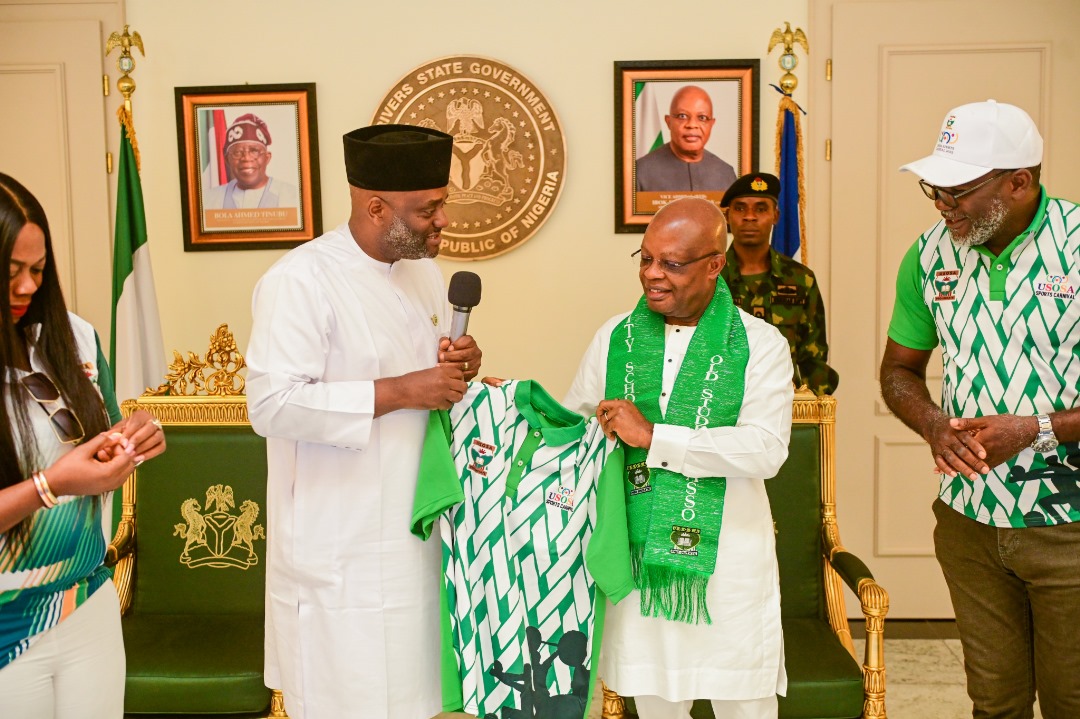
The Administrator of Rivers State, Retired Vice Admiral Ibok-Ete Ekwe Ibas, has assured the commitment of Rivers State government to workers’s welfare and industrial harmony in Rivers State.
The Sole Administrator gave the assurance after meeting with leadership of organized labour unions at the Government House, Port Harcourt on Wednesday.
Ibas reaffirmed government’s policy of prompt payment of salaries and pensions to workers and retirees, stating that all local government employees are not receiving the approved minimum wage.
He disclosed that approval has been given for payment of newly employed staff at Rivers State University Teaching Hospital and the Judiciary, while medical workers in Local Government Areas will now receive correct wages.
Ibas explained that, Government is reviewing implementation challenges of the Contributory Pension Scheme ahead of the July 2025 deadline, adding that Intervention buses have been reintroduced to ease workers’ transportation ,with plans to expand the fleet.
He said specialized leadership training for top civil servants will commence within two weeks, while due consideration is being given to implementing the N32,000 consequential adjustment for pensioners and clearing outstanding gratuities.
Ibas commended Rivers State workers for their dedication to service and called for sustained partnership with labour unions to maintain industrial peace.
“This administration recognizes workers as critical partners in development. We remain committed to addressing your legitimate concerns within available resources,” he stated.
The State NLC Chairman, Comrade Alex Agwanwor, thanked the Administrator for the steps taken so far with regard to workers welfare while appreciating his disposition towards alleviating the transportation problem faced by workers.
He also expressed appreciation for the government’s openness to dialogue and pledged continued cooperation towards achieving mutual goals.
The Rivers State Government assured all workers of its unwavering commitment to their welfare and called for continued dedication to service delivery for the collective progress of our dear State.
Featured
Labour Unions In Rivers Call For Improved Standard Living For Workers
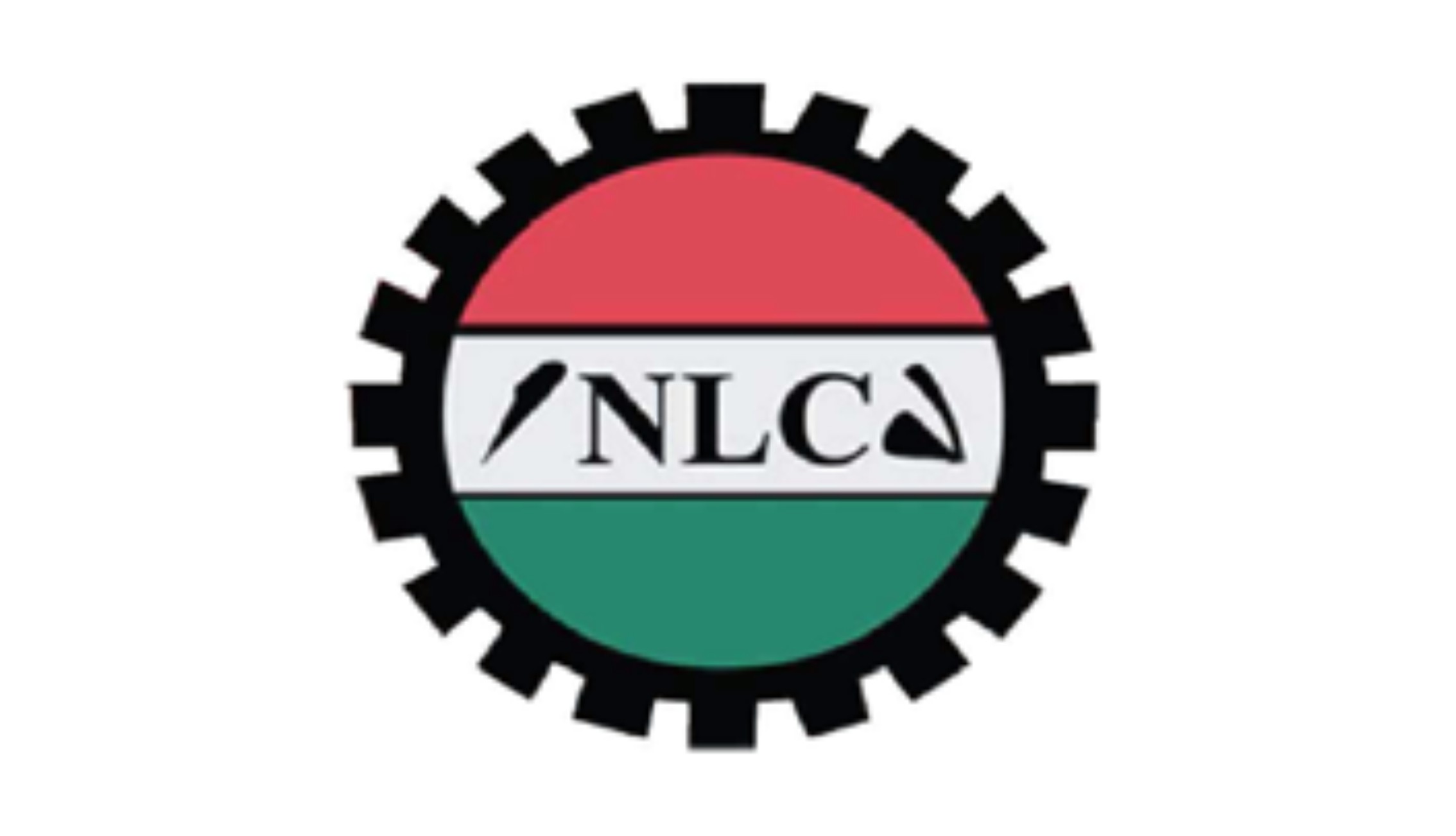
The Nigeria Labour Congress (NLC), Rivers Council, has called for policies that will improve the economic situation of the country in order to ensure enhanced living standard for workers.
The State Chairman, Mr Alex Agwanwor, made the remark on behalf of the unions affiliated to Labour Congress during the 2025 workers day celebration in Port Harcourt, yesterday.
Agwanwor highlighted the demands of the Unions which included the immediate payment of pension arrears, implementation of the N32,000 minimum wage for pensioners, and payment of gratuities and death benefits without further delay.
“We are calling for the regulation and protection of e-hailing drivers, implementation of increments and promotions, and resolution of long-standing issues in the polytechnic sector,” he said.
Agwanwor on behalf of the unions appealed to President Bola Tinubu to reinstate the democratically elected Governor, Deputy Governor, and members of the Rivers State House of Assembly.
He stressed the importance of democratic governance and good working relationship with elected representatives.
According to him, the unions expressed disappointment over the imposition of taxes, increase in electricity tariff, and high cost of goods and services, which have further worsened the plight of workers.
“We urge the federal government to take measures to alleviate the suffering of citizens,” he said.
Featured
Tinubu committed to unlocking Nigeria’s potential – Shettima

Vice-President Kashim Shettima says President Bola Tinubu is committed to unlocking Nigeria’s full potential and position the country as a leading force on the African continent.
Shettima stated this when he hosted a delegation from the Hertie School of Governance, Berlin, led by its Senior Fellow, Dr Rolf Alter, at the Presidential Villa in Abuja last Wednesday.
He said Nigeria was actively seeking expertise from the global best institutions to enhance policy formulation and implementation, particularly in human capital development.
The Vice-President noted that President Tinubu was determined to elevate Nigeria to its rightful position as a leading force in Africa.
“The current crop of leadership in Nigeria under President Bola Ahmed Tinubu is ready and willing to unleash the full potential of the Nigerian nation on the African continent.
” We are laying the groundwork through strategic reforms, and at the heart of it, is human capital development.”
He described the Hertie School as a valuable partner in the journey.
According to him, Hertie School of Governance, Berlin, has track record and institutional knowledge to add value to our policy formulation and delivery, especially in this disruptive age.
Shettima reiterated the government’s priority on upskilling Nigerians, saying ” skills are very important, and with our Human Capital Development (HCD) 2.0 programme.
“We are in a position to unleash the full potential of the Nigerian people by enhancing their capital skills.”
The Vice-President acknowledged the vital support of international development partners in that effort.
” I want to thank the World Bank, the European Union, the Bill and Melinda Gates Foundation, and all our partners in that drive to add value to the Nigerian nation,” he maintained.
The Vice-President said human capital development was both an economic imperative and a social necessity.
Shettima assured the delegation of the government’s readiness to deepen cooperation.
” We need the skills and the capacity from your school. The world is now knowledge-driven.
“I wish to implore you to have a very warm and robust partnership with the government and people of Nigeria.”
Shettima further explained recent economic decisions of the government, including fuel subsidy removal and foreign exchange reforms.
“The removal of fuel subsidy, the unification of the exchange rate regime and the revolution in the energy sector are all painful processes, but at the end of the day, the Nigerian people will laugh last.
“President Tinubu is a very modern leader who is willing to take far-reaching, courageous decisions to reposition the Nigerian economy,” he added.
Earlier, Alter, congratulated the Tinubu administration for the successful launch and implementation of the Human Capital Development (HCD) strategy.
The group leader described the development as ambitious and targeted towards the improvement of the lives of the citizens.
He expressed satisfaction with the outcome of his engagements since arriving in the country.
He applauded the zeal, commitment, energy and goodwill observed among stakeholders in the implementation of Nigeria’s HCD programme.
Alter said the Hertie School of Governance would work closely with authorities in Nigeria across different levels to deliver programmes specifically designed to address the unique needs of the country.
He, however, stressed the need for government officials at different levels to be agile and amenable to the dynamics of the evolving world, particularly as Nigeria attempted to successfully accelerate its human capital development aspirations.
-
Business4 days ago
Smuggled Rice Tops Seized Items List In 2025
-
Rivers3 days ago
Obi Donates 80 Desks To Schools In Etche
-

 Opinion4 days ago
Opinion4 days agoEnding Malaria Menace For Improved Health
-
Sports4 days ago
Arsenal Eye Special Performance In Paris
-

 News4 days ago
News4 days agoFG Licenses 11 New Private Universities
-
Business4 days ago
Over 2m Passengers Board Blue Rail Train – Commissioner
-

 Featured3 days ago
Featured3 days agoLabour Unions In Rivers Call For Improved Standard Living For Workers
-

 Opinion4 days ago
Opinion4 days agoNigeria’s Poor Economy And High Unemployment Rates




